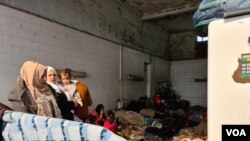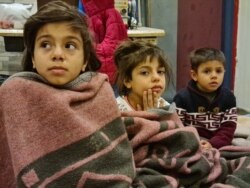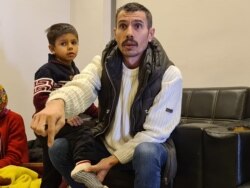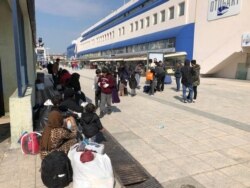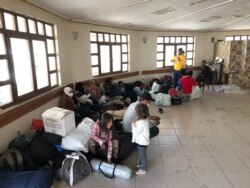“If we don’t get coronavirus, we will get diseases from the bathrooms,” said Amjed, 24, a Syrian refugee, speaking to us on WhatsApp from a squalid, makeshift camp near Turkey’s border with Greece.
He had been there for two weeks and was using the last 5 percent of his phone charge. In the days prior, he had eaten only two pieces of cheese.
“But we don’t want to leave, because then these two weeks of suffering will have been for nothing,” Amjed said. A few hours later, security forces ordered him and his friends onto a bus bound for Istanbul. Exhausted, they complied. Other people refused and stayed in the camp.
Many businesses, offices and houses of worship are closed across Turkey and average people are mostly staying at home. But thousands of refugees remain on the move, unprotected from the novel coronavirus, and, as they are quick to point out, unprotected from everything else.
Amjed, like other refugees caught up in this most recent crisis, went to the border after Turkey announced late last month that it would no longer stop refugees who wanted to cross into Europe.
People came by bus from all over the country until thousands amassed at camps along the Greek border. Turkish security forces accompanied them, leading to a tense stand-off that regularly erupted in clashes.
Over time, the refugees’ hopes faded with the tear gas, beatings and quick deportations. Last week, Turkish security forces who once pushed them to try to cross, seemed more interested in moving them away from the border, sending buses daily to return them to the cities.
Now hundreds of men, women and children are landing in bus stations or other places, homeless and broke. Large aid organizations say they can do little to help, with workers ordered to stay home because of the virus.
“Nothing was done to protect us from this,” Amjed explained. “We asked just for masks and they did not even respond.”
The bus station
In a small room upstairs in Istanbul’s main bus station, Omar, his wife and three small children live on handouts from a few informal volunteers. Omar fled Syria years ago, after witnessing two of his colleagues beheaded by Islamic State militants.
As a refugee in Turkey, he faced discrimination and abject poverty. Recently, he was kicked out of his apartment because he couldn’t afford the rent. Crossing to Europe, he told us, seemed like their only hope.
But when they tried to enter Greece, the family was immediately arrested, he said. And as they were being deported from Greece, security forces treated them as if they were infected.
“They took 50 of us in a closed truck with only five holes to breathe out of,” he told us. “One person screamed for air, and the security forces beat him with a stick. They kept their distance and would not touch us with their hands, but they had sticks.”
If he and his family were exposed, said Omar, there is not much he can do about it. His children are already sick and there are no available doctors or medicine.
“They haven’t even showered in eight days,” he said.
The gas station
And while families like Omar’s seek any help they can get in Turkey, other refugees are still determined to get out.
At a gas station on a country road not far from the Greek border last week, dozens of refugees set up blankets in the carports for their children to sleep. More than a week ago, they demanded to stay there when security forces tried to bus them to Istanbul.
“Can you imagine this suffering?” shouted Dallal Abdulrazak when she saw us coming. “Tell people what is happening here. Get a camera and put this on television.”
When the camera was set up, a security guard said, “It is forbidden to film.”
Still, the men and women talked over each other, describing what happened when they tried to cross into Greece. “I was beaten, robbed and then they sent me back,” said a young Libyan man who called himself Abu Mohammed. “But I would rather die at the gates of Europe than go back.”
A few minutes later, Turkish security officials arrived, announcing they were sending a bus, and everyone would be transported to Istanbul within the hour.
Officials want them to go to the city or to the border, explained Mahmoud, a 35-year-old father of seven from Syria, wearing a scarf over his mouth and nose.
But neither the border nor the city seems safe, he told us. In Istanbul, they would be homeless and exposed to many dangers, including the virus. And no one is crossing the border to Greece right now, so it’s not only unsafe to live in a crowded, dirty camp, it is also pointless, Mahmoud said.
“We sold everything we had to get here,” Mahmoud added. “We can’t go back.”
Despair
The next morning, back at the Istanbul bus station, some families had already moved on to find relatives or friends to take them in.
Others, like Omar and his children, had no place to go. Up to a hundred people arrive daily.
A couple of volunteers helped find food and shelter, paying from their pockets or with small donations from friends and family.
A few men wandered around the ground floor. They told us they were looking for a place to rest but security guards wouldn’t let them sleep inside because of the coronavirus.
One volunteer got a text from someone at the border, updating him on the buses headed for Istanbul. It was not yet clear how many would come that day because some families didn’t want to leave and risk being exposed to the virus in the city.
But some buses departed, and the volunteers found the station manager to warn him to expect a large influx of desperate, hungry and heartbroken people in the coming days and weeks.
After the meeting, a volunteer described the encounter,
“They said, ‘We can’t even have a meeting with more than two people because of the virus,’” he told me. “What can we do?”




